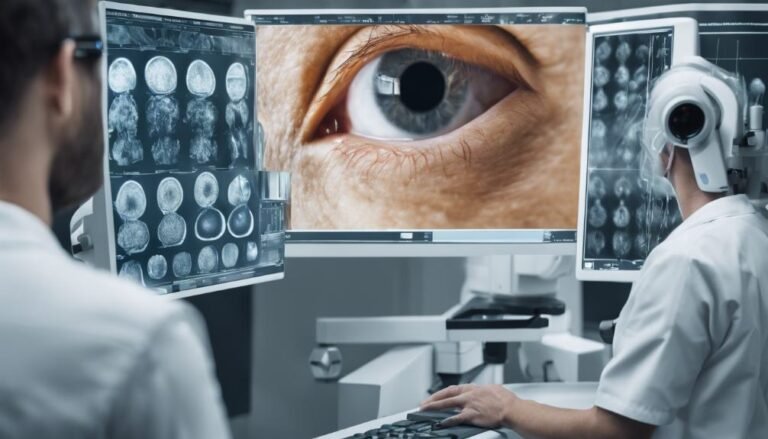AI for Data Integration in Healthcare
In the ever-evolving landscape of healthcare, the intersection of AI and data integration stands as a beacon of progress. Imagine a domain where patient records seamlessly flow, diagnoses are swift, and treatment plans are tailored with precision. But how does AI truly revolutionize the integration of data in healthcare? Let's explore the intricate web of possibilities where technology meets patient care, shaping a future that holds boundless potential for improving healthcare outcomes and efficiency.
Key Takeaways
- AI enhances efficiency by managing patient data accurately.
- Predictive analytics forecasts health outcomes based on historical data.
- Identifies patterns for early disease detection.
- Tailors treatment plans using extensive patient data.
- Improves patient outcomes by minimizing adverse effects.
The Power of AI in Healthcare Data
Utilizing AI in healthcare data integration processes greatly enhances efficiency and accuracy in managing and analyzing vast amounts of patient information. Predictive analytics, a key component of AI, enables healthcare providers to forecast potential health outcomes based on historical data. By leveraging predictive analytics, healthcare professionals can identify patterns and trends within patient data, leading to early detection of diseases and personalized treatment plans.
Essential medicine is another vital aspect that AI facilitates in healthcare data integration. AI algorithms can sift through extensive patient data, including genetic information, lifestyle factors, and medical history, to tailor treatments according to individual needs. This personalized approach improves patient outcomes by ensuring treatments aren't only effective but also minimize adverse effects.
Benefits of AI Integration
Enhancing data processing efficiency and decision-making accuracy, AI integration in healthcare offers a myriad of benefits for optimizing patient care. By leveraging AI technology, healthcare organizations can achieve improved accuracy in diagnoses and treatment plans. AI algorithms can analyze vast amounts of patient data with precision, leading to more accurate predictions and personalized healthcare recommendations.
Streamlined processes are another significant advantage of AI integration. Automation of routine tasks such as appointment scheduling, patient monitoring, and administrative workflows can free up healthcare professionals to focus more on patient care. This efficiency not only saves time but also reduces the likelihood of human errors in data entry and documentation.
Moreover, AI integration enables real-time data analysis, allowing healthcare providers to make informed decisions promptly. This rapid access to critical information can enhance emergency response times and overall patient outcomes.
Overcoming Integration Challenges
Addressing the obstacles to successful integration of AI in healthcare data systems requires a strategic approach and meticulous attention to detail. Two significant challenges in this domain are data silos and interoperability.
Data silos occur when information is trapped in isolated systems, hindering seamless data exchange. To overcome this, organizations must invest in robust data integration solutions that can break down these silos and enable data flow across various platforms.
Interoperability, on the other hand, refers to the ability of different information systems, devices, and applications to connect, communicate, and exchange data in a coordinated manner. Achieving interoperability is essential for AI integration as it ensures that data can be shared and utilized efficiently across the healthcare ecosystem.
Moreover, technology limitations and the lack of standardization pose additional hurdles. Healthcare organizations must address these challenges by adopting advanced technologies that can support AI integration and by promoting standardized data formats and protocols. By overcoming these obstacles, healthcare providers can tap into the full potential of AI in improving patient outcomes and operational efficiency.
AI's Impact on Patient Care
To sum up, markedly AI greatly impacts patient care by revolutionizing diagnostic accuracy and treatment decisions in healthcare settings. Through technology advancements, AI analyzes vast amounts of patient data to provide personalized care, leading to improved patient outcomes and enhanced patient experience.
By leveraging AI algorithms, healthcare providers can offer tailored treatment plans based on individual characteristics, medical history, and genetic makeup. This level of precision not only enhances the effectiveness of treatments but also minimizes potential side effects.
Moreover, AI assists in predicting health trends and potential risks for patients, allowing healthcare professionals to intervene proactively and prevent adverse outcomes. This proactive approach to patient care contributes significantly to better patient outcomes and overall satisfaction with the healthcare system.
Additionally, AI-enabled tools streamline administrative processes, enabling healthcare providers to spend more time focusing on direct patient care, ultimately enhancing the quality of patient experience. Ultimately, AI's impact on patient care is profound, offering a new era of personalized and effective healthcare delivery.
Future of Data Integration
As you look ahead at the future of data integration in healthcare, it's imperative to take into account the rapid advancements in AI technology. These advancements hold the promise of streamlining integration processes and enhancing data accuracy.
However, it's important to acknowledge the unique challenges that the healthcare industry faces when it comes to integrating diverse sources of data effectively.
AI Advancements in Integration
With rapid advancements in artificial intelligence technology, the future of data integration in healthcare is poised to revolutionize the way information is managed and utilized. AI algorithms are becoming increasingly sophisticated, enabling more efficient integration of diverse healthcare data sources. Integration strategies utilizing AI solutions are enhancing data interoperability, allowing for seamless communication between different systems and applications.
AI advancements in integration are streamlining processes by automating data mapping, transformation, and cleansing tasks. Machine learning algorithms are being employed to identify patterns within large datasets, facilitating faster and more accurate integration of information. Furthermore, AI-driven tools are improving the quality of data by detecting inconsistencies and errors in real-time.
The implementation of AI in data integration is paving the way for enhanced decision-making capabilities in healthcare, enabling quicker access to critical information and insights. As technology continues to evolve, healthcare organizations can leverage these advancements to achieve better patient outcomes, optimize operational efficiency, and drive innovation in the field.
Challenges in Healthcare Integration
Exploring the future landscape of data integration in healthcare presents intricate challenges that require strategic solutions. Interoperability issues remain a significant hurdle, as disparate systems struggle to communicate effectively, hindering seamless data exchange between healthcare providers. These challenges are further compounded by data security risks, necessitating robust measures to safeguard sensitive patient information from cyber threats.
Moreover, technology limitations pose a barrier to achieving thorough integration across different platforms and devices. The diverse array of systems used in healthcare settings often lack standardized protocols, making data integration a complex and arduous task.
Regulatory complexities add another layer of difficulty, as healthcare organizations must navigate a web of laws and guidelines governing data sharing and privacy.
Addressing these challenges will require a multi-faceted approach, integrating advanced technologies like AI to streamline processes, enhance data security, and improve interoperability. Collaborative efforts among stakeholders, including policymakers, healthcare providers, and technology experts, are essential to overcoming these obstacles and realizing the full potential of data integration in healthcare.
Enhancing Operational Efficiencies
Implementing AI technology in data integration processes can greatly enhance operational efficiencies in healthcare organizations. By leveraging AI for workflow automation, tasks that were previously manual and time-consuming can be streamlined, leading to significant cost savings and process optimization.
AI can automate repetitive tasks such as data entry, allowing staff to focus on more critical aspects of their roles. Workflow automation also facilitates faster decision-making processes, reducing turnaround times for patient care.
Moreover, AI can assist in resource allocation by analyzing data patterns to predict patient admissions, staff requirements, and equipment needs accurately. This guarantees that resources are efficiently distributed, preventing bottlenecks and delays in patient care.
Conclusion
To sum up, AI's integration in healthcare data management revolutionizes patient care through predictive analytics and personalized treatment plans.
But, can we truly harness the full potential of AI to improve health outcomes and optimize operational efficiencies?
Only time will tell as we continue to navigate the ever-evolving landscape of healthcare technology.







